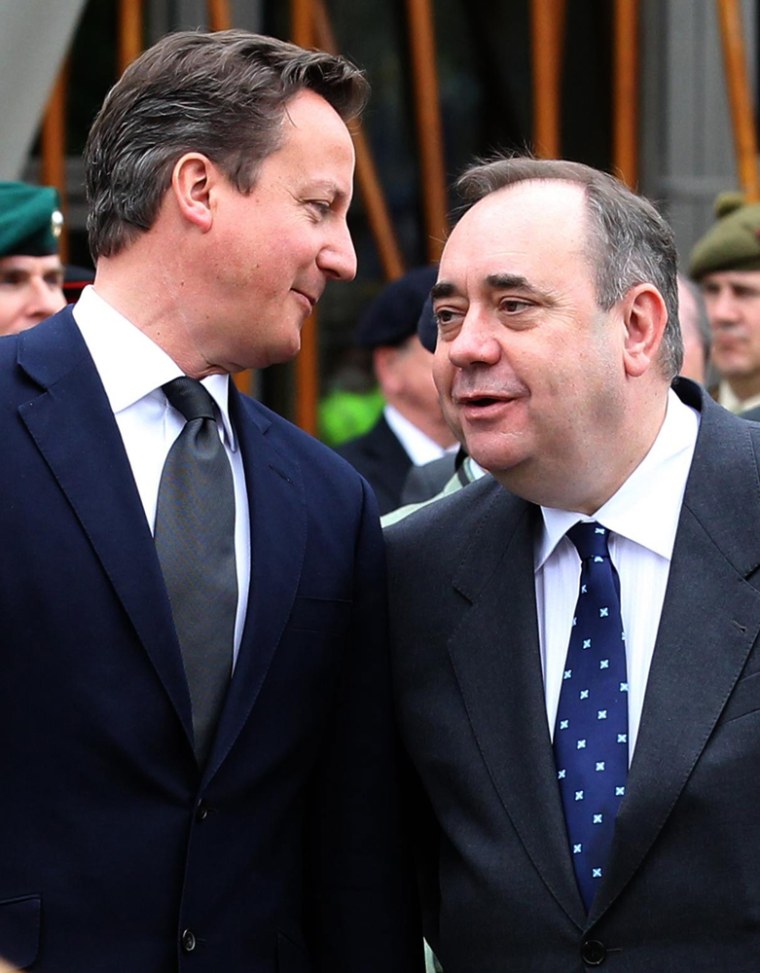Scotland's devolved government said on Tuesday it wanted to hold a referendum in 2014 on breaking away from the rest of Britain, setting up a clash with London which wants the vote held as soon as possible to dispel uncertainty.
The Scottish and British governments began playing a cat-and-mouse game over the future of the 300-year-old union between Scotland and England, with London saying the Scottish parliament had no legal authority to call a referendum on independence.
Scottish First Minister Alex Salmond, who has previously said a referendum should be held between 2014 and 2016, said on Tuesday the Scottish Cabinet wanted the vote held in the autumn of 2014.
Politicians based at the U.K. parliament in London must "resist the temptation" to interfere in Scottish politics, Salmond added.
"This is the biggest decision in Scotland for 300 years," he told Sky News. "This has to be a referendum which is built in Scotland."
Speaking to the BBC on Wednesday, Salmond highlighted that his ruling Scottish National Party had last year "won an overwhelming majority on the promise that we would offer the people a referendum on their own future. Is it not entirely reasonable that that referendum ... is made in Scotland and decided by the Scottish people?"
Scotland has many of the trappings of an independent nation — its own flag, sports teams and a history of achievements in science and literature.
Scotland, which kept its own legal system after the 1707 union, has had a devolved government since 1999 with control over education, health and justice. It can also make minor alterations to income tax in the nation of five million. For now, London retains primacy on all matters relating to Britain as a whole — including defense, energy and foreign relations.
The SNP argues that Scotland would prosper as a small country in its own right. Salmond told Reuters last year that Scotland would be entitled to the lion's share of North Sea oil revenues if it went its own way.
He also wants Scotland to have its own forces and foreign policy, rejecting nuclear submarines based close to Glasgow.
'Sooner not later'
Trying to seize the initiative from pro-independence Salmond, London said it would allow Scotland to hold an independence referendum but only on terms acceptable to it.
British Prime Minister David Cameron — who opposes any breakup of the United Kingdom, which also includes Wales and Northern Ireland — says uncertainty over Scotland's future is damaging investment in the Scottish economy and wants the referendum "sooner rather than later."
The British government said on Tuesday the Scottish parliament had no power to call a referendum on independence and said it risked being struck down by the courts.
It offered to grant the Scottish parliament the power to hold a referendum but said it wanted it held promptly.
"It is essential that the referendum is legal, fair and decisive. As a government, we have been clear ... that we will not stand in the way of a referendum on independence. But neither will we stand on the sidelines and let uncertainty continue," Michael Moore, the British minister responsible for Scotland, told parliament.
London wants only one question on the ballot paper, a yes or no on independence, ruling out a second question on granting more powers to the devolved Scottish government that voters wary of full independence might opt for.
Salmond said Scots objected to the conditions that the British parliament was attempting to attach to the referendum.
"The prime minister (Cameron) in the last 48 hours ... seems to be saying here's the power but incidentally we are going to start pulling the strings," he said.
Rising support for independence
The timing of the vote could be crucial. Recent opinion polls indicate rising support for independence, after surveys showed backing for the separation hovering at about 30 percent for several decades.
Salmond's Scottish National Party won a majority in Scottish elections last year, putting him in a strong position to push for a referendum on independence.
Cameron's center-right Conservatives are weak in Scotland, with only 15 seats in the 129-member Scottish parliament.
Some reports say the party hopes to exploit two events in 2014, the Commonwealth Games in Glasgow and the 700th anniversary of the Battle of Bannockburn when the Scots vanquished an English army, to create momentum for a breakaway.
The other nations of the U.K. also have administrations with some limited powers. Wales voted for a national assembly in 1997, while the Northern Ireland Assembly was created to provide cross-community government in the province under the U.S.-brokered Good Friday peace accord of 1998.
Salmond's party has said that if it succeeds in winning independence, Scotland would keep Queen Elizabeth II as head of state and — for now at least — retain the British pound as its currency.
